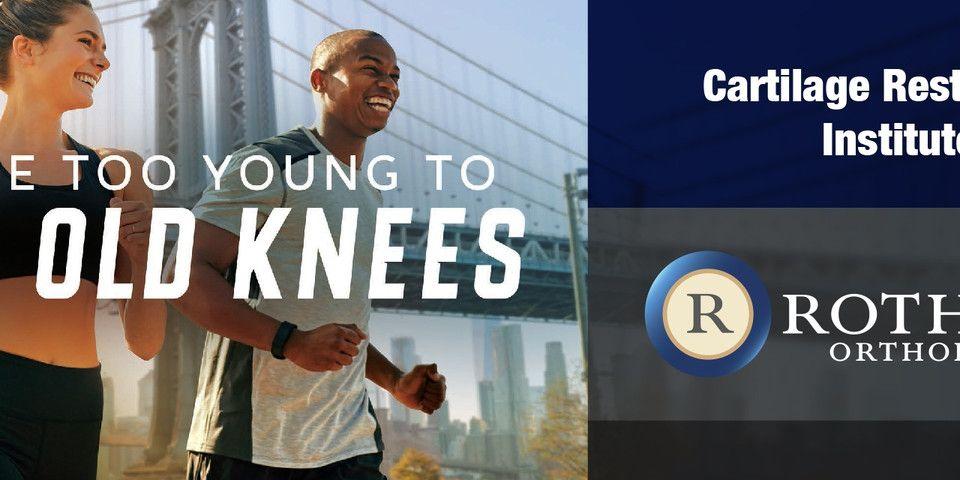Three Signs You Might Need Joint Surgery Near Princeton
Rothman Orthopaedic Institute Offers Effective Surgical Options for Joint Patients
Joint issues are incredibly common, especially among aging persons, persons with structural defects, and those with chronic orthopaedic conditions. For those dealing with the painful and lifestyle-altering symptoms of joint conditions, it’s difficult to know what the best road forward is in terms of treatment.
While no two joint conditions or patients are alike, there are common indicators that surgery may be recommended. If it is determined that surgery is the best treatment option for your particular joint issues, then joint surgery near Princeton performed by the joint specialists of Trenton Orthopaedic Group at Rothman Orthopaedic Institute is the most effective, reliable, and convenient source for surgical treatment.
Joint patients require specialized care; especially when surgery is required. Trenton Orthopaedic Group features expert physicians, advanced methods and resources, and an unparalleled reputation for elite-quality orthopaedic care. With convenient locations in the Trenton area, TOG is the ideal practice for residents of South Jersey to pursue the joint surgery they need and begin reclaiming their active, healthy lifestyles.
But is joint surgery near Princeton right for you? A physical examination by a qualified doctor or specialist can determine whether surgery is necessary in your case or if nonsurgical treatment options will be sufficient.
The experts at Rothman Orthopaedic Institute have compiled the following list to familiarize you with the telltale signs of serious joint conditions that may require surgical treatment.
Three Indicators of Candidacy for Joint Surgery Near Princeton
-
Persistent Symptoms
Are you experiencing persistent pain or symptoms of immobility in your shoulders, hips, elbows, knees, wrists, or other joints? The presence of chronic symptoms may indicate a serious joint condition. Symptoms may include:-
Swelling and inflammation
-
Chronic pain; may increase after activity, sleep, or as the day progresses
-
Stiffness and immobility
-
Warmth or redness surrounding the joint
-
Joint is tender to the touch
The presence of warmth, redness, tenderness, or severe pain within the joint should be met with immediate medical attention, as these symptoms may suggest a more serious joint issue or complication.
Many of the above-listed symptoms can be effectively managed with nonoperative treatment options; the emergence of these symptoms does not necessarily mean that joint surgery will be required.
-
-
Significant Joint Degeneration
There are numerous chronic conditions that cause the affected joints to degrade and gradually degenerate. The most common of these is arthritis, including osteoarthritis (wear-and-tear arthritis associated with aging), rheumatoid arthritis (an autoimmune disease that affects people of all ages), and posttraumatic arthritis (caused by physical damage from traumatic injuries). Advanced degeneration may require joint surgery for arthritis.
Arthritis is far from the only degenerative joint condition to commonly affect patients, however. Bursitis, lupus, and ankylosing spondylitis are just three of the many conditions that may cause serious joint damage to occur.
The symptoms of chronic degenerative joint conditions can often be managed with anti-inflammatory medications and non-operative therapies; however, to effectively treat them at their root cause, targeted joint surgery by a qualified specialist is often needed. -
Inefficacy of Non-Operative Treatments
When patients are affected by mild or early-stage joint issues, non-operative treatment options are frequently advised. These treatments may prove sufficient for managing joint conditions and allow patients to avoid the stress of surgery. Such treatment options include:-
Lifestyle modifications
-
Physical therapy
-
The use of assistive devices
-
Non-steroidal anti-inflammatory medications
-
Cortisone injections
-
If symptoms are not effectively reversed using these treatment measures or if joint damage continues to accrue, a surgical solution (including joint replacement surgery) will likely be recommended.
Joint Surgery at Rothman Orthopaedic Institute
Rothman Orthopaedic Institute features one of the nation’s highest volumes of joint replacement surgeries and features highly experienced joint specialists with elite training and methods. To learn more about joint surgery near Princeton at Trenton Orthopaedic Group at Rothman Orthopaedic Institute or to schedule an appointment, please visit us here or contact us at 1.800.321.9999.
Related Physicians
Locations
Related Specialties
Related Conditions
- Ankle Sprains and Fractures
- Arthritis - Foot and Ankle
- Degenerative Joint Disease - Hip (Osteoarthritis)
- Elbow Arthritis
- Elbow Fracture
- Hand and Wrist Arthritis
- Hip Pain Treatment
- Knee - Loose Bodies/Spurs
- Knee Arthritis
- Loose Bodies in the Hip
- Shoulder Arthritis
- Shoulder Impingement Syndrome
- Snapping Hip
- Wrist Fractures
- Wrist Tendonitis
Related Treatments
- Bilateral Knee Replacement
- Closed Reduction (SC Joint)
- Foot and Ankle Surgery
- Hand & Wrist Joint Reconstruction Surgery
- Hand and Wrist Arthritis Treatments
- Minimally Invasive Knee Surgery
- Non-operative Shoulder Instability Treatment
- Non-operative Shoulder Separation Treatment
- Non-operative Throwing Injury
- Non-Operative Wrist Fracture Treatment
- Non-operative Wrist Tendonitis Treatment
- Revision Knee Surgery
- Shoulder Arthritis Treatment
- Shoulder Instability Surgery
- Shoulder Replacement Surgery
- Shoulder Separation Surgery
- Throwing Injury Surgeries
- Total Knee Arthroplasty
- Total Knee Replacement
- Wrist Fracture Surgery
- Wrist Tendonitis Surgery
Related Programs
-

Cartilage Restoration Institute
This is a center where patients can go to have their disabled joint biological resurfaced, realigned, and stabilized without having the joint replaced by artificial materials such as metal and plastic. It is well known that the outcomes of patients under the age of 50 undergoing artificial joint replacement are not as good as we would like. Therefore we feel the future of Orthopaedics is to try to restore a joint back to its original anatomy by realignment, ligament reconstruction, and cartilage restoration.Read More -

Hip Arthroscopy Program
Rothman Orthopaedics is one of the nation’s leaders in the growing field of hip arthroscopy. Our program includes experienced board certified surgeons in Pennsylvania, New Jersey and Florida.Read More




